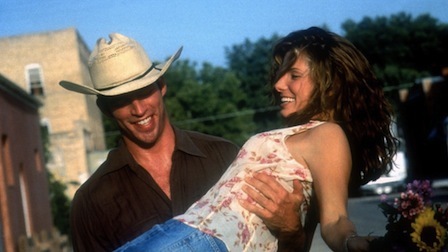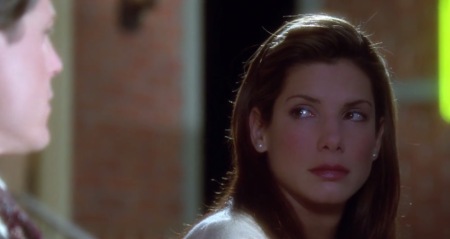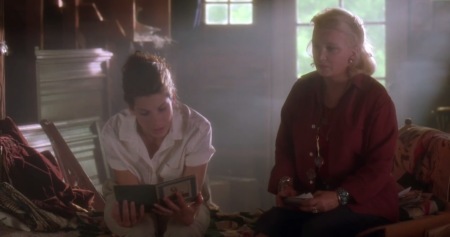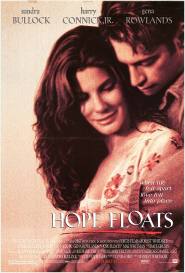With Sandra Bullock's 50th birthday approaching we'll be looking at a few of her films. Here's Andrew Kendall on a little discussed '98 picture. - Ed.

Is it strange that when asked to celebrate Sandra Bullock’s birthday with a film from her oeuvre I immediately turned to the 1998 (ostensible) romantic drama Hope Floats? Despite the 80 million dollars at the box office the film was not quite a hit and critics were not impressed. Yet, whenever I’m asked to stump for a Bullock performance I tend to turn to Birdee Pruitt not necessarily as the “best” Bullock, or not even quintessential Bullock but my favourite Bullock.
The well-intentioned, sometimes – oftentimes – too treacly Hope Floats from writer Steven Rogers (who did a better job handling domestic dramas that same year with Stepmom) and direct Forrest Whitaker (who helmed his strongest film three years earlier with Waiting to Exhale) is a movie I feel warmer towards than I should. It gets a bit turgid in the middle falling prey to the lazy, but not necessarily inaccurate, complaint that it’s probably too long. But I can’t turn my back on the easy warmness of the film, mostly because of its able bodied cast – Harry Connick Jr being just the right amount of cocky and charming, Mae Whitman giving one of the best children performances of the nineties, and Gena Rowlands giving the type of performance that would net an aging actresses an Oscar nomination if this was 1940s (think Gladys Cooper in Now, Voyager). And, of course, Sandra Bullock – the lead performance the film lives and dies by. [More...]

And, yet, the film almost immediately destroys the goodwill before Sandra even has a chance to work. Because, that opening scene is something peculiar. Hope Floats opens with our heroine finding out her husband is having an affair with her best friend on a daytime TV talk-show. The placid film which follows seems at odds with this almost farcically bizarre opening, made even more incongruous by the fact that we’re never sure how to react to the scene. Poor Birdie Pruitt think she’s there for a makeover and as the cheers of the audience ring through realises her best friend and her husband have been unfaithful to her. It’s a gauche opening, it’s too broad and the tone seems off. But focus on Sandra in the moment to know how to respond. Even then she had already nailed the ability to be an effective dramatic performer in less than auspicious circumstances, even though in 2009 you'd think critics were now realising that Sandra could do dramatic work effectively.
The opening, though, gets worrisome because it suggests that Whitaker and Rogers aren’t confident enough in Sandra to believe she can gain our trust. So we’re forced into a position where we must pity her from the get-go by way of this humilaiting talk-show opening. But Sandra, unbelievably, makes the moment work. As Birdie’s world crumbles around her on national television where her young daughter bawling in the audience (again, is the opening going for farce or melodrama?) Sandra face tells a story of a more sensitive, mature film. Trying too hard is one of the surest criticisms for any developing actor, but watching Hope Floats and seeing Sandra working at landing these dramatic moments only makes me more appreciative of the work she’s doing. And overtime the film itself manages to catch up with her – even though she’s given a mountain of a task to overcome.

The film spends much time telling us about the days when Birdie was the Queen-Bee in high-school. She was the snooty prom-queen who left her hometown, in Texas, after graduation with the high school golden boy as her husband. It’s the same town in the middle of nowhere she returns to after her TV-talks-show humiliation with her daughter and as she meets old classmates it’s difficult to draw the line of continuance between the beleaguered, and sometimes downtrodden Birdie with the idea of the social butterfly her classmates refer to. Faced with the task of alienating the audience by playing too much of Birdie’s resentments over her failed marriage, officious mother, resentful daughter and generally unhappy life Sandra manages to toe the line between dejected without descending into maudlin and staying warm and accessible without seeming like a martyr. The most familiar assets of Bullock’s career are not on full view here – this is not the bubbly, grinning Sandra but a more guarded, sadder one. Birdie is overwhelmed by her talkative mother and adjusting daughter. She’s so closed off on paper it’s a wonder we find her so easy to love, but that ineffable star quality of Sandra’s is key. More than that, though, her ability to make crucial emotional connections with co-stars gives the film energy.
 Hope Floats is never the romantic drama that its poster suggests. The dalliance with Harry Connick Jr (never more dashing) is incidental in the wake of more serious issues at hand. For the movie that ambles along is much more interested in the simple things like recovering from humiliation and more tender moments the rapport between mother and daughter. For, it is the three generations of Calvert women – Gena Rowland’s earth-grand-mother to Bullock’s now repressed former beauty queen to Mae Whitman’s resentful Berenice which give the film’s its backbone, and it is Bullock at the centre exuding undeniable warmth that Hope Floats needs to – well – float. We don’t question the way the screenplay never explains Birdie’s cluelessness re her clearly failing marriage, or her moments of gumption which seem at odds with her more repressed moments. A film like Hope Floats needs you to suspend disbelief about the reasons and just give over to the reality of this wronged woman building her life back. With a tighter hook this could be a great women’s picture from the seventies. And Sandra is more than game making the film's most tender moments opposite Whitman and Rowlands sing.
Hope Floats is never the romantic drama that its poster suggests. The dalliance with Harry Connick Jr (never more dashing) is incidental in the wake of more serious issues at hand. For the movie that ambles along is much more interested in the simple things like recovering from humiliation and more tender moments the rapport between mother and daughter. For, it is the three generations of Calvert women – Gena Rowland’s earth-grand-mother to Bullock’s now repressed former beauty queen to Mae Whitman’s resentful Berenice which give the film’s its backbone, and it is Bullock at the centre exuding undeniable warmth that Hope Floats needs to – well – float. We don’t question the way the screenplay never explains Birdie’s cluelessness re her clearly failing marriage, or her moments of gumption which seem at odds with her more repressed moments. A film like Hope Floats needs you to suspend disbelief about the reasons and just give over to the reality of this wronged woman building her life back. With a tighter hook this could be a great women’s picture from the seventies. And Sandra is more than game making the film's most tender moments opposite Whitman and Rowlands sing.
If Bullock’s edges seemed frayed (I’m a fan but will admit the performance is not faultless) it’s because Hope Floats such as an essential part of her development as a dramatic actor. The film was coolly received by critics and I suspect it didn’t necessarily encourage Sandra to headline a film specifically like this again. I imagine an alternate world where buoyed by her work here we’d see this as a stepping stone for her to work her way up to something like a maternal drama like Alice Doesn’t Live Here Anymore or a post-divorce drama An Unmarried Woman. I love Sandra the comedienne, but her tender work as a leading lady is not particular revered. She’s dug into drama since, and there are attributes of Birdie (the prickliness, the ability to charm with a smile, the easy romantic chemistry) she’s used excellently elsewhere but she’s never quite done something like this drama with a small-scale scope but a large heart again. Which makes it that much more of a curio, and probably explains my inclination to return to it whenever I think of Sandra.